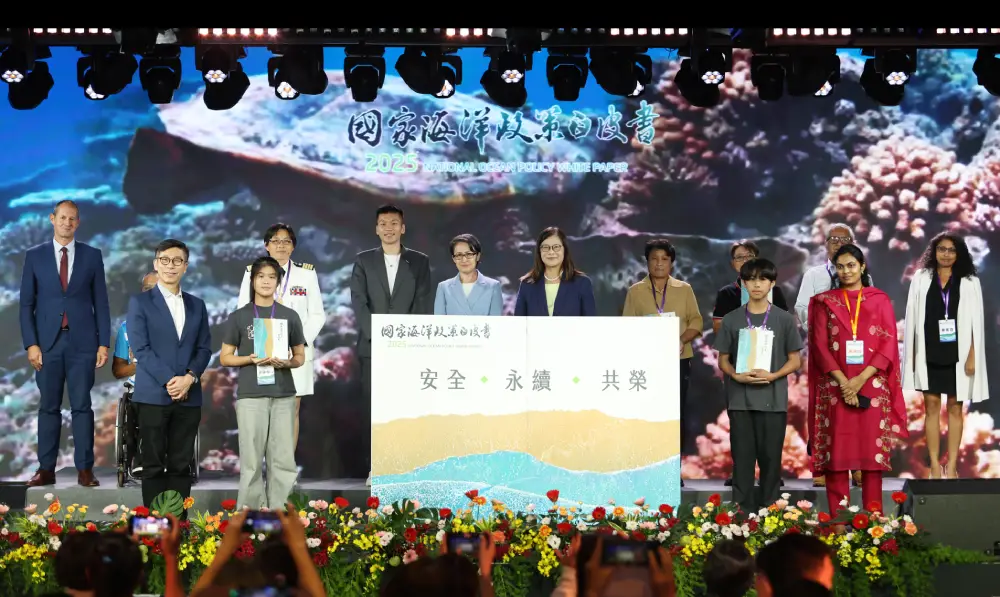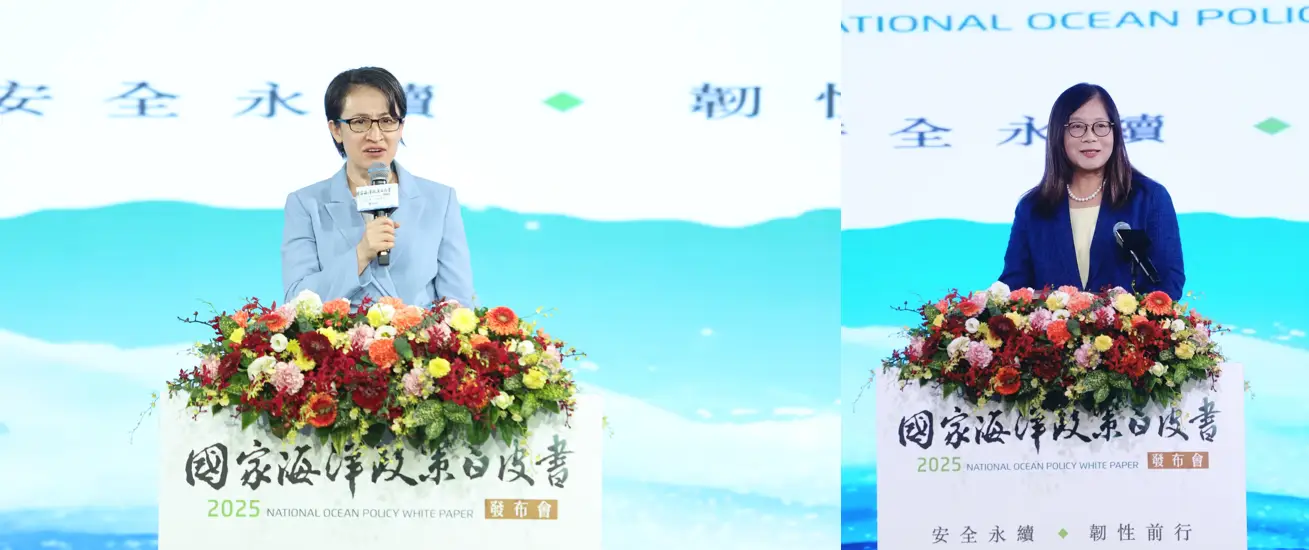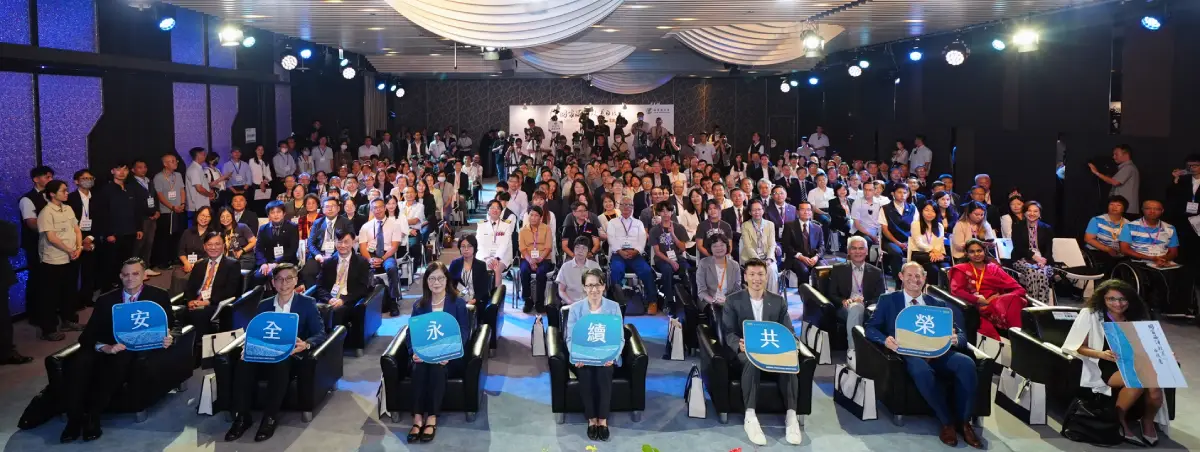Vice President Hsiao Unveils New National Ocean Policy White Paper as Minister Kuan Highlights Vision for a Resilient Ocean Nation
Vice President Hsiao Unveils New National Ocean Policy White Paper as Minister Kuan Highlights Vision for a Resilient Ocean Nation

Official release of the 2025 National Ocean Policy White Paper
Vice President Hsiao today (25th) attended the launch ceremony of the 2025 National Ocean Policy White Paper, organized by the Ocean Affairs Council (OAC). Joined by distinguished guests symbolizing a safe, sustainable, and prosperous ocean, the event marked the culmination of over a year of inter-ministerial consultations. Centered on the concept of "resilience," the blueprint sets out three core policy objectives, "Safe Ocean," "Sustainable Ocean," and "Prosperous Ocean," aiming to guide Taiwan toward becoming a highly resilient ocean nation.
The launch ceremony was jointly officiated by Vice President Hsiao Bi-khim, OAC Minister Kuan Bi-ling, Minister of Sports Lee Yang, together with Captain Shu-ching Huang, the Navy's first female frigate commander; Ms. Mei-Jin Li, a nationally recognized model fisher; Ms. Chao-ling Huang, Taiwan's first female pilot; Mr. Kuo-chia Chen, a leading advocate for disability sports; Professor Jiang-ping Wang, an expert in cetacean rescue; as well as youth representatives Hao-han Wu and Chen-hsi Huang from the "No Dropout" Alliance—symbolizing the nation's collective commitment to building a resilient ocean.
Vice President Hsiao remarks that President Lai Ching-te, in his inaugural address last year, outlined the vision of "Reaching for Space, Exploring the Ocean." She stressed that this is not merely a slogan, but a call to leverage Taiwan's strengths as a maritime nation to drive technological and industrial development. Although space and the ocean may appear distant from one another, in reality they are closely interconnected. With satellite technology, it is possible to monitor vessel movements, ocean conditions, and weather in real time. Space technology extends beyond the limits of human sight, linking maritime security, resource management, and ecological monitoring into an intelligent network. Thus, the ocean and space are no longer isolated domains, but essential partners in safeguarding our planet.
To advance the vision set forth in the 2025 National Ocean Policy White Paper, Vice President Hsiao also made a heartfelt appeal, noting that the Legislative Yuan will soon deliberate on the Special Budget for National Security Resilience, which includes urgent needs of the OAC. She called on all parties across the political spectrum to lend their support, working together to safeguard Taiwan's long-term security and development.

Vice President Bi-khim Hsiao (left) and OAC Minister Bi-ling Kuan (right) deliver remarks
Vice President Hsiao further emphasized that ocean policy is not the sole responsibility of the OAC. Agencies responsible for sports, economy, agriculture, transportation, scientific research, and conservation, together with private-sector partners, are all integral to the implementation of the National Ocean Policy. She expressed hope that all ministries would work hand in hand to translate the White Paper's vision into concrete actions, enabling Taiwan to demonstrate responsibility, values, and commitment in global ocean engagement.
Opening the ceremony, OAC Minister Kuan first extended her heartfelt concern to the residents of Hualien affected by the recent typhoon disaster, conveyed her condolences to the families of the victims, and expressed her deep respect for frontline rescue, reconstruction personnel, and volunteers. Minister Kuan stressed that, at this moment, the launch of the White Paper should be conducted in a solemn spirit. Accordingly, the originally planned performances were cancelled. She also instructed the Coast Guard Administration to devote its full efforts to supporting relief operations, with the hope that Hualien will soon regain stability and vitality.
At the launch ceremony, the OAC reviewed the concrete progress achieved since the release of the 2020 National Ocean Policy White Paper. Over NT$100 billion has been invested to advance 177 key initiatives, delivering tangible contributions to Taiwan's security, economy, and environment. Notable achievements include the construction of 95 new Coast Guard vessels; the successful elimination of illegal sand dredging; the amendment or enactment of the Marine Pollution Control Act, the Marine Conservation Act, and the Marine Industry Development Act; and the growth of the blue economy to NT$1.2 trillion, accounting for 5.4% of GDP and generating employment opportunities for more than one million people.
At the same time, the OAC chose this moment to unveil the new White Paper—on the 10th anniversary of the United Nations' adoption of the “2030 Agenda for Sustainable Development," and at a critical juncture ahead of the entry into force of the "Agreement under the United Nations Convention on the Law of the Sea on the conservation and sustainable use of marine biological diversity of areas beyond national jurisdiction" (BBNJ Agreement) in 2026. This underscores Taiwan's determination to fulfill its role as a responsible member of the global democratic community and as a key ocean nation.

Group photo at the Launch Ceremony of the 2025 National Ocean Policy White Paper
Minister Kuan emphasized that Taiwan has long faced several intensifying maritime challenges:
- The gap between vision and resources. In areas such as deep-sea exploration, marine energy, and smart monitoring, Taiwan's future demand for funding and talent far exceeds current levels of investment, requiring stronger support.
- The challenge of inter-ministerial coordination. Ocean affairs and governance cut across multiple agencies—including fisheries, transportation, environmental protection, and national defense—highlighting the need for a stronger coordinating platform to achieve effective cross-agency collaboration.
- The tension between economic development and environmental protection. The competing interests among offshore wind power, fisheries, tourism, and ecological conservation call for broader coordination and cooperation to identify pathways for coexistence and shared prosperity.
- Geopolitical pressures. China's increasingly frequent gray-zone maritime intrusions represent a long-term structural challenge for Taiwan, one that is likely to grow even more formidable in the future.
To address these challenges, the new White Paper presents a highly forward-looking and comprehensive blueprint. It not only encompasses legal frameworks, technology, industry, and conservation, but also positions Taiwan as an active participant in the international maritime order. More than a declaration of intent, the White Paper sets out 66 strategies and 253 concrete measures, jointly advanced by 19 ministries and agencies, to ensure that the policy direction translates into tangible action—ultimately achieving the three overarching goals of "security," "sustainability," and "shared prosperity."
- Building a "Secure Ocean" Strengthening the foundations of national sovereignty and regional stability
Safeguarding Taiwan's maritime borders will shift from traditional manpower and visual surveillance to intelligent, technology-driven monitoring. Investments in next-generation patrol vessels, unmanned systems, integrated surveillance networks, and artificial intelligence will provide stronger support for both coast guard operations and national defense. - Advancing a "Sustainable Ocean": Fulfilling the responsibility of harmony between nature and humanity
Taiwan must transform from being a developer of marine resources to becoming a guardian of marine ecosystems. By promoting nature-based solutions, the nation seeks to realize the vision of true coexistence between people and the ocean. - Pursuing a "Shared Ocean" Building the values of an inclusive and equitable maritime society
Through comprehensive marine spatial planning, diverse ocean uses, such as offshore wind power, sustainable fisheries, maritime transport, and marine recreation can coexist in an orderly and fair manner. This approach mitigates conflict and fosters win-win outcomes. Minister Kuan underscored that the ocean is Taiwan's lifeline. Taiwan lives by the ocean, depends on the ocean, and must protect the ocean. The White Paper is not merely a written commitment, but a roadmap for action. The government's aspirations are ambitious and the challenges immense, yet its resolve remains firm. Looking ahead, Taiwan will safeguard with technology, sustain with responsibility, and achieve shared prosperity through collective participation—working together to build a resilient ocean nation defined by security, sustainability, and inclusiveness.
